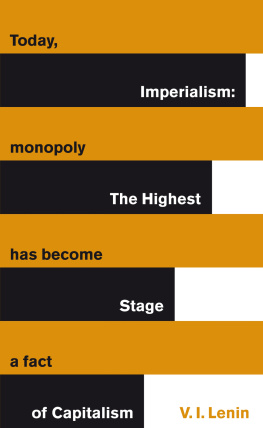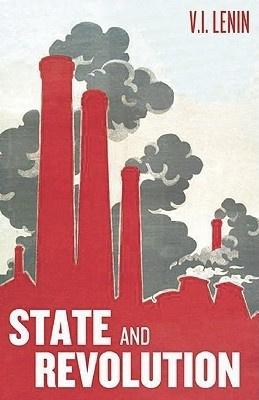V. I. Lenin
Imperialism: The Highest Stage of Capitalism
A Popular Outline
PENGUIN BOOKS GREAT IDEAS
PENGUIN BOOKS
Published by the Penguin Group
Penguin Books Ltd, 80 Strand, London WC2R 0RL , England
Penguin Group (USA) Inc., 375 Hudson Street, New York, New York 10014, USA
Penguin Group (Canada), 90 Eglinton Avenue East, Suite 700, Toronto, Ontario, Canada M4P 2Y3
(a division of Pearson Penguin Canada Inc.)
Penguin Ireland, 25 St Stephens Green, Dublin 2, Ireland (a division of Penguin Books Ltd)
Penguin Group (Australia), 250 Camberwell Road, Camberwell, Victoria 3124, Australia
(a division of Pearson Australia Group Pty Ltd)
Penguin Books India Pvt Ltd, 11 Community Centre, Panchsheel Park, New Delhi 110 017, India
Penguin Group (NZ), 67 Apollo Drive, Rosedale, North Shore 0632, New Zealand
(a division of Pearson New Zealand Ltd)
Penguin Books (South Africa) (Pty) Ltd, 24 Sturdee Avenue, Rosebank, Johannesburg 2196, South Africa
Penguin Books Ltd, Registered Offices: 80 Strand, London WC2R 0RL , England
www.penguin.com
First published 1916
This edition published in Penguin Books 2010
All rights reserved
Except in the United States of America, this book is sold subject to the condition that it shall not, by way of trade or otherwise, be lent, re-sold, hired out, or otherwise circulated without the publishers prior consent in any form of binding or cover other than that in which it is published and without a similar condition including this condition being imposed on the subsequent purchaser
ISBN: 978-0-14-194640-5
V. I. Lenin
18701924
Preface to the Russian Edition
The pamphlet here presented to the reader was written in Zrich in the spring of 1916. In the conditions in which I was obliged to work there I naturally suffered somewhat from a shortage of French and English literature and from a serious dearth of Russian literature. However, I made use of the principal English work, Imperialism, J. A. Hobsons book, with all the care that, in my opinion, that work deserves.
This pamphlet was written with an eye to the tsarist censorship. Hence, I was not only forced to confine myself strictly to an exclusively theoretical, mainly economic analysis of facts, but to formulate the few necessary observations on politics with extreme caution, by hints, in that sopian language in that cursed sopian language to which tsarism compelled all revolutionaries to have recourse whenever they took up their pens to write a legal work.
It is very painful, in these days of liberty, to read these cramped passages of the pamphlet, crushed, as they seem, in an iron vice, distorted on account of the censor. Of how imperialism is the eve of the socialist revolution; of how social-chauvinism (socialism in words, chauvinism in deeds) is the utter betrayal of socialism, complete desertion to the side of the bourgeoisie; of how the split in the labour movement is bound up with the objective . In order to show, in a guise acceptable to the censors, how shamefully the capitalists and the social-chauvinist deserters (whom Kautsky opposes with so much inconsistency) lie on the question of annexations; in order to show with what cynicism they screen the annexations of their capitalists, I was forced to quote as an example Japan! The careful reader will easily substitute Russia for Japan, and Finland, Poland, Courland, the Ukraine, Khiva, Bokhara, Estonia or other regions peopled by non-Great Russians, for Korea.
I trust that this pamphlet will help the reader to understand the fundamental economic question, viz., the question of the economic essence of imperialism, for unless this is studied, it will be impossible to understand and appraise modern war and modern politics.
Petrograd, April 26, 1917
Preface to the French and German Editions
I
As was indicated in the preface to the Russian edition, this pamphlet was written in 1916, with an eye to the tsarist censorship. I am unable to revise the whole text at the present time, nor, perhaps, is this advisable, since the main purpose of the book was and remains: to present, on the basis of the summarised returns of irrefutable bourgeois statistics, and the admissions of bourgeois scholars of all countries, a general picture of the world capitalist system in its international relationships at the beginning of the twentieth century on the eve of the first world imperialist war.
To a certain extent it will be useful for many Communists in advanced capitalist countries to convince themselves by the example of this pamphlet, legal, from the standpoint of the tsarist censor, of the possibility and necessity of making use of even the slight remnants of legality which still remain at the disposal of the Communists, say, in contemporary America or France, after the recent wholesale arrests of Communists, in order to explain the utter falsity of social-pacifist views and hopes for world democracy. The most essential of what should be added to this censored pamphlet I shall try to present in this preface.
II
In the pamphlet I proved that the war of 191418 was imperialistic (that is, an annexationist, predatory, plunderous war) on the part of both sides; it was a war for the division of the world, for the partition and repartition of colonies, spheres of influence of finance capital, etc.
Proof of what was the true social, or rather, the true class character of the war is naturally to be found, not in the diplomatic history of the war, but in an analysis of the objective position of the ruling classes in all belligerent countries. In order to depict this objective position one must not take examples or isolated data (in view of the extreme complexity of social life it is always quite easy to select any number of examples or separate data to prove any point one desires), but the whole of the data concerning the basis of economic life in all the belligerent countries and the whole world.
It is precisely irrefutable summarised data of this kind that I quoted in describing the partition of the world in the period of 1876 to 1914 (in chapter VI) and the distribution of the railways all over the world in the period of 1890 to 1913 (in chapter VII). Railways combine within themselves the basic capitalist industries: coal, iron and steel; and they are the most striking index of the development of international trade and bourgeois-democratic civilisation. In the preceding chapters of the book I showed how the railways are linked up with large-scale industry, with monopolies, syndicates, cartels, trusts, banks and the financial oligarchy. The uneven distribution of the railways, their uneven development sums up, as it were, modern world monopolist capitalism. And this summing up proves that imperialist wars are absolutely inevitable under such an economic system, as long as private property in the means of production exists.
The building of railways seems to be a simple, natural, democratic, cultural and civilising enterprise; that is what it is in the opinion of bourgeois professors, who are paid to depict capitalist slavery in bright colours, and in the opinion of petty-bourgeois philistines. But as a matter of fact the capitalist threads, which in thousands of different intercrossings bind these enterprises with private property in the means of production in general, have converted this work of construction into an instrument for oppressing a thousand million people (in the colonies and semi-colonies), that is, more than half the population of the globe, which inhabits the subject countries, as well as the wage slaves of capitalism in the lands of civilisation.
Next page








